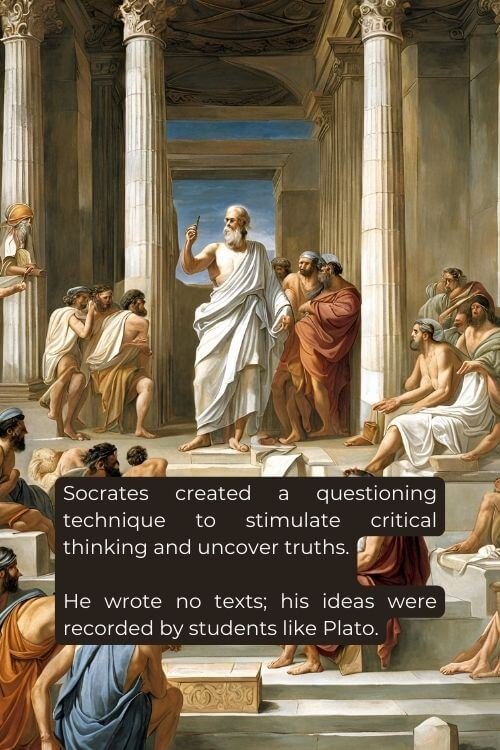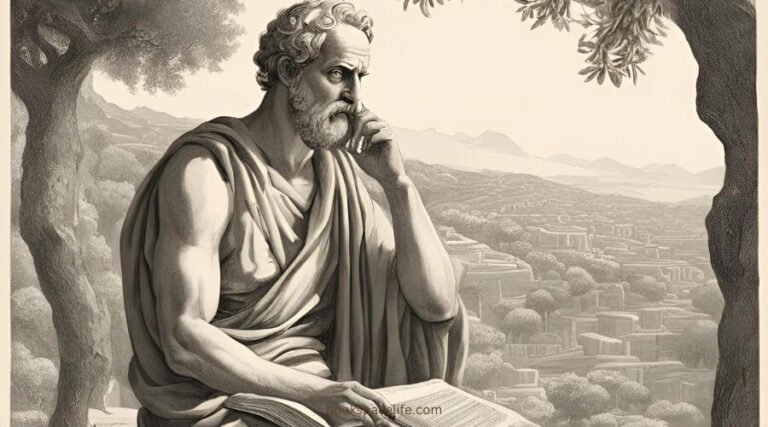Thales of Miletus
socrates: The Father of Western Philosophy
Socrates (470 – 399 BCE) is often regarded as one of the most significant figures in Western philosophy.
His unique approach to ethics and knowledge laid the foundation for much of Western thought and influenced countless philosophers who followed.
Socrates is famous not only for his philosophical contributions but also for his distinctive method of inquiry and his unwavering commitment to seeking truth and virtue.
This blog post will explore Socrates’s life, travels, early education, philosophical beliefs, and the profound impact he had on philosophy and the world.
Quick Read
Table of Contents
(1) Early Life and Education
Socrates was born in Athens, Greece, around 470 or 469 BCE. The details of his early life remain largely obscure, as Socrates did not leave behind written works; much of what we know comes from the accounts of later philosophers, particularly Plato and Xenophon.
He was born to a stonemason named Sophroniscus and a midwife named Phaenarete, and his humble beginnings likely shaped his character and outlook on life.
While Socrates’s formal education is not well-documented, he is believed to have studied under various sophists and philosophers of his time.
The Sophists were itinerant teachers who claimed to teach success in public life, particularly through rhetoric.
However, Socrates was critical of the Sophists, questioning their emphasis on persuasion over truth.
His philosophical development occurred not through traditional schooling but through dialogues with citizens of Athens, where he challenged their beliefs and sought to expose contradictions in their thinking.

(2) Travels and Philosophical Development
Socrates’s life was primarily centered in Athens, where he spent most of his time engaging in discussions and debates with fellow Athenians.
He is known to have traveled occasionally, but specific details about his travels remain vague.
The historical context of Athens, particularly during the Golden Age, played a crucial role in shaping his ideas.
Socrates’s philosophical approach emphasized the importance of self-examination and critical thinking.
He famously claimed that “the unexamined life is not worth living,” advocating for introspection and the pursuit of knowledge as essential to a fulfilling existence.
His dialogues often took the form of questions and answers, leading his interlocutors to realize their ignorance and prompting them to seek deeper understanding.
(3) Philosophical Contributions
- The Socratic Method: One of Socrates’s most significant contributions to philosophy is the Socratic Method, a form of cooperative argumentative dialogue that stimulates critical thinking and illuminates ideas. This method involves asking a series of questions that lead participants to arrive at conclusions on their own. Through this process, Socrates aimed to expose contradictions in his interlocutors’ beliefs and encourage them to seek clarity and truth.
The Socratic Method has become a foundational technique in education and philosophy, emphasizing the importance of dialogue and inquiry in the pursuit of knowledge. I
t has been widely adopted in various fields, including law and pedagogy, as a means of fostering critical thinking and intellectual engagement.
- Ethics and Virtue: Socrates is often regarded as a moral philosopher, and his ethical beliefs emphasize the pursuit of virtue and the importance of knowledge in achieving a good life. He famously stated, “No one does wrong willingly,” suggesting that wrongdoing is a result of ignorance rather than malice. According to Socrates, understanding what is right is essential to living virtuously; thus, the pursuit of knowledge is inherently linked to ethical behavior.
Socratic ethics prioritize self-knowledge and the cultivation of virtue, promoting the idea that individuals should strive for personal integrity and moral excellence.
Socrates believed that living a virtuous life leads to true happiness, and he encouraged others to examine their values and motivations critically.
- The Theory of Forms: While the Theory of Forms is more closely associated with Plato, Socrates’s influence on this concept is significant. The Theory of Forms posits that there are abstract, perfect ideals (Forms) that exist beyond the physical world. Socrates’s dialectical approach laid the groundwork for this idea, as he often sought to define universal concepts such as justice, beauty, and goodness through dialogue and inquiry.
Socratic discussions frequently revolved around identifying the essence of these concepts, leading Plato to develop the Theory of Forms in his later writings.
This exploration of abstract ideas has profoundly influenced metaphysics and epistemology throughout the history of philosophy.
- Political Philosophy: Socrates’s philosophical inquiries extended to political matters, where he emphasized the importance of justice and the role of the individual in society. He believed that a just society is one in which individuals act according to virtue and knowledge rather than self-interest. Socrates’s commitment to truth and ethical principles often put him at odds with the prevailing political norms of his time.
His dialogues frequently questioned the nature of authority, governance, and citizenship, laying the groundwork for later political philosophers, including Plato and Aristotle.
Socrates’s ideas about civic responsibility and ethical leadership continue to resonate in contemporary discussions about democracy and political ethics.
- The Importance of Knowledge: Central to Socratic philosophy is the belief that knowledge is paramount in the pursuit of virtue and ethical living. Socrates famously claimed that he was the wisest man in Athens because he recognized his own ignorance. This acknowledgment of one’s limitations is a cornerstone of Socratic wisdom, emphasizing that the quest for knowledge is an ongoing journey rather than a destination.
Socrates encouraged individuals to question their assumptions and beliefs, fostering a culture of intellectual curiosity and self-examination.
This emphasis on knowledge as a means to achieve virtue has influenced countless philosophical traditions and remains relevant in contemporary philosophical discourse.

(4) Influence and Impact
Socrates’s life and teachings have had a profound and lasting impact on philosophy, education, and ethics:
- Influence on Plato: Socrates’s most notable student was Plato, who chronicled his mentor’s teachings and dialogues in a series of works, including the “Dialogues”. Through Plato, Socratic thought was preserved and disseminated, shaping the course of Western philosophy. Plato’s writings reflect Socratic principles and expand upon them, particularly in metaphysics and ethics.
The Socratic Method and the pursuit of virtue became foundational elements in Plato’s philosophy, influencing his own theories of knowledge and reality.
The relationship between Socrates and Plato exemplifies the transmission of philosophical ideas across generations.
- Impact on Western Philosophy: Socrates is often considered the father of Western philosophy due to his emphasis on reason, critical inquiry, and ethical living. His teachings laid the groundwork for subsequent philosophical movements, including Stoicism, Skepticism, and Ethical Philosophy. Many of the questions Socrates posed about knowledge, morality, and existence continue to shape philosophical discussions today.
His legacy endures in the works of later philosophers such as Aristotle, Kant, and Nietzsche, who grappled with the implications of Socratic thought in their own inquiries.
The influence of Socratic ideas can be seen in various fields, including ethics, political theory, and epistemology.
- Cultural and Educational Influence: The Socratic Method has become a fundamental pedagogical approach in modern education. It encourages active participation, critical thinking, and collaborative learning, fostering a culture of inquiry that values dialogue and exploration. Many educators adopt Socratic questioning techniques to promote deeper understanding and engagement among students.
Socrates’s emphasis on self-examination and ethical living resonates in contemporary discussions about education, personal development, and civic responsibility.
His belief in the importance of critical inquiry encourages individuals to question societal norms and engage with complex ethical dilemmas.
- Enduring Questions: The questions Socrates posed about the nature of truth, virtue, and knowledge continue to resonate in modern philosophical discourse. His challenges to assumptions about morality and existence invite ongoing reflection and debate, encouraging individuals to grapple with fundamental questions about the human condition.
The legacy of Socratic thought is evident in contemporary discussions surrounding ethics, political philosophy, and the pursuit of knowledge. Philosophers, educators, and citizens alike are inspired by Socrates’s commitment to seeking truth and living a virtuous life.
- Cultural Legacy: Socrates’s trial and execution, as recounted by Plato, highlight his dedication to truth and integrity, even in the face of adversity. His refusal to abandon his principles ultimately cemented his status as a martyr for philosophy and a symbol of the pursuit of knowledge.
Socratic themes of moral courage and intellectual integrity continue to inspire individuals striving for authenticity and ethical living in their personal and professional lives.
His legacy as a philosopher who valued truth above all else serves as a guiding principle for those engaged in the pursuit of knowledge.
(5) Conclusion
Socrates stands as a monumental figure in the annals of Western philosophy, whose contributions to ethics, rhetoric, and the pursuit of knowledge have profoundly shaped the course of intellectual history.
Through his unique approach to inquiry, he challenged individuals to examine their beliefs and strive for self-understanding and virtue.
His teachings, preserved and expanded upon by later philosophers, continue to resonate in contemporary discourse, inviting us to engage critically with the complexities of existence and ethical living.
As we reflect on Socrates’s life and philosophy, we are reminded of the enduring power of dialogue and the importance of questioning our assumptions.
Socrates’s legacy endures as a testament to the transformative nature of philosophy and the vital role it plays in fostering personal growth, ethical reflection, and intellectual curiosity.
In a world where the pursuit of truth remains paramount, Socrates’s insights continue to inspire individuals to seek knowledge, embrace uncertainty, and live authentically in the quest for a meaningful life.
(A) 7 Quick Facts on Socrates
- Born in Athens – Socrates was born around 470 BCE in Athens, Greece.
- Self-Taught Philosopher – Socrates claimed his wisdom came from self-inquiry, not formal education.
- Served as a Soldier – He fought as a hoplite in the Peloponnesian War.
- Developed Socratic Method – He created a questioning technique to stimulate critical thinking and uncover truths.
- Never Wrote – Socrates wrote no texts; his ideas were recorded by students like Plato.
- Focused on Ethics – He emphasized moral philosophy, especially concepts like virtue and justice.
- Executed in 399 BCE – Convicted of impiety and corrupting youth, Socrates was sentenced to death by poison.
(B) 10 Quotes attributed to Socrates
- The unexamined life is not worth living. Emphasizing the importance of self-reflection and questioning one’s beliefs.
- I know that I am intelligent because I know that I know nothing. Highlighting the value of humility and recognizing one’s limitations in knowledge.
- To find yourself, think for yourself. Encouraging independence of thought and personal inquiry.
- Wisdom begins in wonder. Suggesting that curiosity is the starting point of all learning. An honest man is always a child.
- An honest man is always a child. Implying that true honesty requires a sense of openness and innocence.
- There is only one good, knowledge, and one evil, ignorance. Asserting that knowledge is the key to virtue and that ignorance leads to wrongdoing.
- The greatest way to live with honor in this world is to be right. Valuing integrity and righteousness as the path to a meaningful life.
- Be kind, for everyone you meet is fighting a hard battle. A reminder of compassion and understanding towards others.
- I cannot teach anybody anything, I can only make them think. Emphasizing the role of dialogue in education and self-discovery.
- Know thyself. A powerful directive urging individuals to understand their own nature and purpose.








